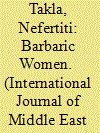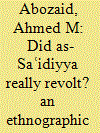| Srl | Item |
| 1 |
ID:
181090


|
|
|
|
|
| Summary/Abstract |
This article analyzes the sensationalized media coverage of a serial murder case during the Egyptian revolution of the early interwar era. Despite conflicting evidence, the media blamed the murders on two sisters from southern Egypt named Raya and Sakina. Through a close reading of Egyptian editorials and news reports, I argue that middle-class nationalists constructed Raya and Sakina as barbaric women who threatened to pull the nation back in time in order to legitimize their claim to power. Borrowing from Ann Stoler's analysis of the relationship between race and sexuality and Maria Lugones's concept of the modern/colonial gender system, this article maintains that race was as central to nationalist conceptions of female barbarism as gender, sexuality, and class. The enduring depiction of Raya and Sakina as the quintessential barbaric Egyptian women symbolizes the way in which the modern woman was constructed at the intersection of race and sexuality.
|
|
|
|
|
|
|
|
|
|
|
|
|
|
|
|
| 2 |
ID:
180041


|
|
|
|
|
| Summary/Abstract |
The purpose of this study is to investigate and inspect the causes that prevented the (marginalised and isolated) society of Saʿid from rebelling against President Mubarak’s authoritarian regime, as the North did. Here I seek to present different interpretation of as-Saʿidiyya’s attitudes toward the 2011 uprising away from the Manichean ‘glorification’ versus ‘ignominy’, or ‘celebrating’ v. ‘contempt’ narrative that dominated the study of the Saʿid and as-Saʿidiyya role in the 2011 Arab uprising. My research is based on interviews, participant observation and ethnographic investigation which articulates the behaviour of peasants as political actors in this time of turmoil, While most sociological and anthropological studies of revolutions concentrate on cities and urban areas, this article focuses on a small town, Madinat Al-Fikriyya, and village, Munshaʿiat Al-Fikriyya in Al-Minya governate in Upper Egypt. Therefore, to understand the role of as-Saʿidiyya in the 2011 uprising, the article suggests three conceptual changes to this convention. Firstly, by putting peasantry communities within socio-political and socio-economic contexts; secondly by concentrating on understanding the dynamics of state-society relations, and lastly, exploring the role of security establishment and levels of penetration into the society in order.
|
|
|
|
|
|
|
|
|
|
|
|
|
|
|
|